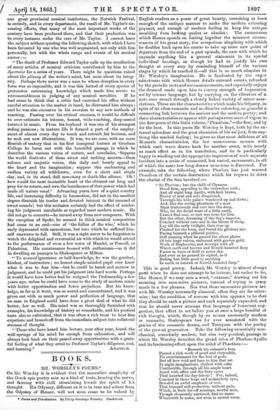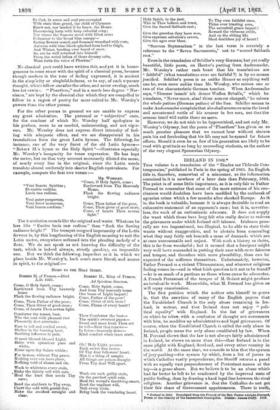BOOKS.
MR. WORSLEY'S POEMS.* OR Mr. Worsley it is evident that the masculine simplicity of the Greek epic poetry acts as a kind of tonic, bracing the nerve, and fanning with chill stimulating breath the spirit of h!s thought. His Odyssey, different as it is in tone and colour from the Odyssey of Homer, will not soon cease to be valued by
* Poems and Translations. By Philip Stanhope Wonder. Blackwood.
English readers as a poem of great beauty, containing at least enough of the antique manner to make the modern colouring piquant, and enough of modem feeling to keep the antique moulding from looking quaint or obsolet". The earnestness which Homer spends on linking together the minutest circum- stances of his great story, the scrupulous simplicity with which he doubles back upon his course to take up some new point of departure from the end of a past episode, the care with which he expands anything like a general statement in its special individual bearings, as though he had to justify his own thought at every step by reminding himself of the various stages by which he reached it—all this is so much stiniulus to Mr. Worsley's imagination. He is fascinated by the eager minuteness with which Homer details outward events, refreshed by the periodic rests and recommencements, and especially enjoys the demand made upon him to convey strength of impression not by intense language, but by carrying on the vibration of a note once struck through a closely linked variety of minor asso- ciations. These are the characteristics which make his Odyssey, in spite of its often romantic and meditative colouring, so graceful a connecting link between the ancient and the modern poetry; and these characteristics re-appear with perhaps even more of vigour in the first poem of this little volume," Phaethon,"—the first, and by far the best. In this poem Mr. Worsley is kept, both by the ex- ternal splendour and the pure classicism of his subject, from any- thing like morbid feeling ; he gives us that most delicious of all Homeric characteristics, the low monotonous scream with which each wave draws back for another onset, with nearly as much effect as in his translation, and he is particularly happy in winding out the appropriate impression of each separate incident into a series of connected, but varied, movements, in all of which the same low long-drawn monotone is discerned. For example, take the following, where Phoebus has just warned Phaethon of the certain destruction which his request to chive the chariot of the Sun involved :-
" So Phcebu.s ; but the child of Clymeno
Stood firm, appealing to the swerveless oath ; And all night long Apollo, with knit brows, Heavy of soul and sore disquieted, Through his wide palace wandered up and down ; And, like the erring phantasm of a man Slain traitorously and cast into the deep, Who, for the dread want of a little earth, Cannot find rest, so rest was none for him.
But the other, dreaming of the day's emprise, Couched without care and in the bloom of sleep, Lay till the early twilight, then rose up
Flushed for the boon, and found his glorious sire Pacing beneath a pillared portico, Still pausing when he passed the silver plains
Of two huge valves, embossed with graven gold, Work of Hephaestus, and descript with all Which earth and heaven and Nereid-haunted deep Foster in wave or field or azure sky.
And ever as he paused he sighed, as if Boding but little good to anything In earth or heaven or Nereid-haunted deep."
This is good poetry. Indeed, Mr. Worsley is almost always goad when lie does not attempt to be intense, but rather to be, like Homer, if we may coin a word, " extense," drawing out his meaning into successive pictures, instead of trying to grasp much in a few phrases. Not that these successive pictures are with Mr. Worsley necessarily classical, often they are far other-
wise ; but the condition of success with him appears to be that they should be each a picture and each separately expanded, and that he should never attempt that language of luxuriant sug- gestion, that effort to set before you at once a large handful of rich thought, which, though by no means necessarily modern or romantic, Shakespeare has for ever associated with the genius of the romantic drama, and Tennyson with the poetry of the present generation. Take the following essentially non-
classical, essentially modern, but also very poetical, passage in which Mr. Worsley describes the grand mien of Phoebus-Apollo and its fascinating effect upon the mind of Phaethon :—
" Beneath his raiment's hem Peered a rich work of pearl and chrysolith, Fit entertainment for the feet of gods. But all how void and bare to him that sat In night-imaginations, clothed with calm Unutterable, through all his ample heart Sated with office and the fiery cares That haunted his day-labour ! For, indeed, Couched in those large and melancholy eyes, Brooded an awful emphasis of rest, That tranquil self-perfection, without pain, Which, in their far-off musings, mortal men, Though eloquently nurtured, find no name Wherewith to name, not even in sacred verse.
So that, in sense and soul pre-occupied With state thus grand, the child of Clymene Knew mot, nor heeded if ho knew, the Hours .
Discoursing harp with harp celestial song ; Nor where the Seasons stood with lifted arms
Columnar to the broad blue canopy—
Spring flowery-zoned, and Summer wreathed with corn; Autumn with vine-blood splashed from heel to thigh, And Whiter, bending over beard of snow. So, ere he well returned into himself From the weird influx of those dreamy orbs, Went forth the voice of Phcebus."
No classical poet could have written this, and yet it is homo- geneous in some sense with the spirit of a classical poem, because though modern in the tone of feeling expressed, it is ancient in the simplicity or singlefoldedness, so to say, of each separate thought, which follow oneafter the other, and never overlap, much less intertwine. "Phaethon," and in a much less degree "Nar- cissas,"are kept by the classical clue which they are compelled to follow in a region of poetry far more suited to Mr. Worsley's powers than the other poems.
For- the other poems in general we are unable to express any great admiration. The personal or " subjective" ones, for the candour of- which Mr. Worsley half apologizes in his preface, seem to us morbid, uninteresting, and not vigor- ous. Mr. Worsley does not express direct intensity of feel- ing with adequate effect, and we are disappointed in his translations from the great Latin hymns. The following, for instance, one of the very finest of the old. Latin hymns- " Robert IL's hymn to the Holy Spirit"—illustrates especially Mr. Worsley's incapacity for tense expression. He has kept the metre, but on that very account necessarily diluted the sense, of nearly every line in the original, since the Latin words translate almost uniformly into shorter English equivalents. For example, compare the first two verses Ma. Woasuzy.
"Come, 0 Holy Spirit, come;
"Veni Sancte Spiritus ; Earthward from Thy Heavenly Et emitte ccelitus, Home, Lucia tua3 radium. Flash the flowing radiance bright.
Come, Thou father of the poor, Come, Thou giver of good store, Come, of hearts Thou sovran light."
The translation sounds like the original and water. What cau be less like " Emitte lucis f1183 radium" than "flash the flowing radiance bright ?" The trumpet-tongued impetuosity of the Latin fervour is, by this lengthening of the English meaning to suit the Latin metre, everywhere softened into the pleading melody of a flute. We do not speak as not knowing the difficulty of the task, which is indeed always, strictly ,peaking, an impossible one. But we think the following, imperfect as it is, which we place beside Mr. Worsley's, both much more literal, and nearer in spirit, to the original :—
HYMN TO THE HOLY SPIRIT.
ROBERT IL of France.—Died A.D. 1031.
Come, 0 Holy Spirit, come ; Earthward from Thy heavenly home Flash the flowing radiance bright.
Come, Thou Father of the poor ; Come, Thou Giver of good store ; Come, of hearts Thou sovran light.
Comforter the truest, best, Who the soul with pleasant rest Pleasantly dost entertain : Ease in toil and cordial sweet, Shelter in the burning heat, Soothing influence in pain.
0 most blessed blessed Light, Shine with splendour pure and white, Shine upon thy Saints within ; For in man, without Thy grace, Nothing ever can have place, Nothing void of shame and sin.
Wash to whiteness every stain, Slake the thirsty soil with rain,
' Heal the hurt that needs Thy care ;
Bend the stubborn to Thy sway, Cheer the cold with genial day, Make the crooked straight and clear.
Veni pater pauperism, Veni dator munerum, Veni lumen cordium."
ROBERT IL, King of France.
Ad Spiritnna Sanctum.
Come, Holy Spirit, come, And from Thy heavenly home One beam of Light impart ! Come, Father of the poor ! Come, Giver of rich store ! Come, Flame of every heart !
Thou Comforter the best— The spirit's sweetest guest— Sweet and most fresh Thou art In toil—Rest that renews— In fever—heavenly dews— Kind comfort when tears start.
Oh! Holy Light, possess Each secret dim recess Of Thy dear followers' heart. Man is a thing of naught. All things are poison-fraught From Thy dear Will apart.
Wash out each guilty stain, On the parched spirit rain, Heal the wound's throbbing smart, Bend the unpliant will, Melt every icicle, Bring back the wandering heart. Holy Spirit, to the lust, Who in Thee believe and trust, Give the Sacred Sabbath-rest ; Give the gaerd.on they have won, Give supreme salvation's crown, Give the ages ever blest.
"Sacrum Septenarium " in the last verse is certainly a reference to the "Seven Sacraments,',' not to "sacred Sabbath rest."
Even in the translation of Schiller's very German; but yet really beautiful, little poem, oa Hector's partiug from Andromache.. Mr. Worsley's rather rash boast that his translations are ‘. faithful" (what translations ever are faithful ?) is by no means justified. Schiller's poem is as unlike Homer as anything well can be; even more unlike than Mr. Worsley, who misses one or two of the characteristic German touches. When Andromache says, "Nimmer lausch' ich definer Waffen Schalle," which be translates, "Never more, alas! thine armour clangeth," he misses the whole pathos (German pathos-) of the line. Schiller means to make Andromache complain that she shall evermo re miss the loved and accustomed rattle of his armour in her ears, not that the armour itself will rattle there no more.
However; we do not wish to be hypercritical, and not only Mr. Worsley's Odyssey, but the poem of "Phaethon" has given us so much genuine pleasure that we cannot hear without sincere pain his sad foreboding that his life may not be spared for future efforts. Should it even be so, few of his generation are likely to be read with gratitude so long by succeeding students, as the author of the very elegant Spenserian Odyssey.
To Thy own faithful ones, Thine ever trusting sons, The sevenfold grace impart ! Reward the virtuous strife, And on the ebbing life Shed deathless joy of heart!































 Previous page
Previous page